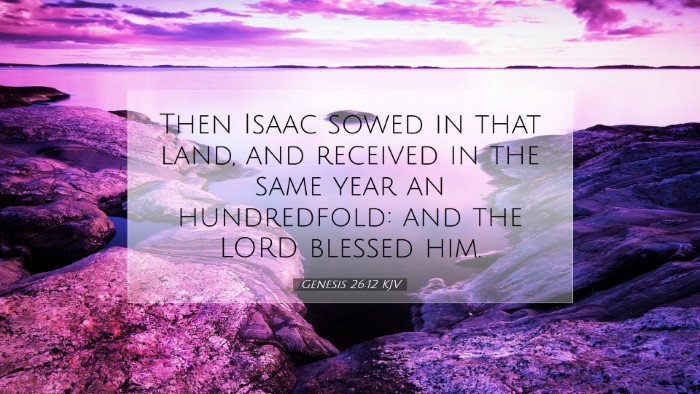Commentary on Genesis 26:12
Genesis 26:12 states, "Then Isaac sowed in that land and reaped in the same year a hundredfold. And the Lord blessed him." This verse marks a significant moment in Isaac's life as it illustrates God's providence and blessing during a time of uncertainty.
Contextual Background
Isaac, son of Abraham, was in Gerar, a land of the Philistines, during a famine. God had instructed him not to go down to Egypt, as his father had done during a previous famine, symbolizing a call to remain in the land entrusted to Abraham. This context is pivotal in understanding the importance of faith and obedience in a challenging environment.
The Act of Sowing
Isaac's decision to sow in the land during a famine signifies an act of faith. According to Matthew Henry, this was an unusual and brave undertaking, highlighting Isaac's reliance on God's promises rather than his circumstances. Adam Clarke elaborates on this, noting that the act of sowing symbolizes investment in God's provision despite external conditions. This faith-driven sowing is rewarded with a bountiful harvest.
Reaping a Hundredfold
The phrase "a hundredfold" indicates not only an extraordinary blessing but also serves as a testament to God's power to provide in seemingly barren times. Albert Barnes emphasizes that this miraculous return illustrates God’s covenant with Isaac—assuring him of blessings multiplied beyond natural expectations. The return on Isaac's sowing is not merely a physical abundance but represents spiritual and communal blessings as well.
Divine Blessing
The concluding phrase, "And the Lord blessed him," is crucial. It underscores that the prosperity Isaac experienced was not a product of his skill or effort alone but a direct result of divine intervention. Notably, this alludes to the overarching biblical theme of God’s sovereignty and active involvement in the lives of His people. Henry states, "What remarkable instances of God's providential care occur in the lives of the saints."
Theological Implications
- Faith Over Fear: Isaac's actions challenge believers to trust in God's provision rather than be paralyzed by fear of difficult circumstances.
- Obedience and Reward: This passage illustrates how obedience to God leads to divine blessings, a principle evident throughout scripture.
- Covenantal Blessings: Isaac’s harvest serves as a reflection of the promises made to Abraham, reaffirming the significance of the Abrahamic covenant in sustaining God's people.
Applications for Pastors and Theologians
For pastors and theologians, Genesis 26:12 challenges congregations to reflect on their own 'sowing' in faith and how they might see God's blessings in their lives. The text encourages a holistic view of prosperity that transcends material wealth and encompasses spiritual growth, community impact, and the deepening of one’s relationship with God.
Conclusion
In summary, Genesis 26:12 is rich with themes of faith, divine providence, and covenantal blessings. Through Isaac's experience, we are assured that God rewards those who diligently seek Him, even when the circumstances suggest otherwise. The legacy of Isaac's faith inspires believers to remain steadfast in their trust and reliance on God’s promises.


